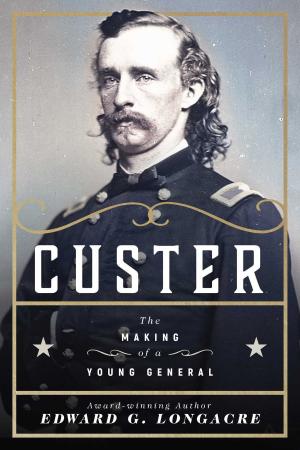Mr. Punch's History of Modern England Vol. I—1841-1857 (of 4 ) (Illustrations)
Nonfiction, History, European General, British, Military| Author: | Charles Larcom Graves | ISBN: | 1230000282514 |
| Publisher: | CASSELL AND COMPANY, LTD | Publication: | November 25, 2014 |
| Imprint: | Language: | English |
| Author: | Charles Larcom Graves |
| ISBN: | 1230000282514 |
| Publisher: | CASSELL AND COMPANY, LTD |
| Publication: | November 25, 2014 |
| Imprint: | |
| Language: | English |
Example in this ebook
The title of this work indicates at once its main source and its limitations. The files of Punch have been generally admitted to be a valuable mine of information on the manners, customs, and fashions of the Victorian age, and of the wealth of material thus provided liberal use has been made. But it must not be forgotten that Punch has always been a London paper, and that in so far as English life is reflected in his pages, London always comes first, though in this volume, and especially during the "Hungry 'Forties," Lancashire comes a very good second. For pictures of provincial society—such, for example, as that given in Cranford or in the novels of Trollope—or of life in Edinburgh or Dublin, the chronicler of Victorian England must look outside Punch. The "country cousin" is not forgotten, but for the most part comes into view when he is on a visit to London, not when he is on his native heath. Yet even with these deductions the amount of material is embarrassingly rich. And this is due not only to the multiplicity of subjects treated, but to the manner in which they were discussed. Of Punch, in his early days at any rate, the criticism recently applied to Victorian writers in general by a writer in Blackwood holds good: "They had a great deal to say, and they said it sometimes in too loud a voice. Such was their virtue, to which their vice was akin. Their vice was the vice of rhetoric. They fell to the temptation of many words. They wrote too often as the tub-thumper speaks, without much self-criticism and with a too fervent desire to be heard immediately and at all costs." In the 'forties Punch doubled the rôles of jester and political pamphleteer, and in the latter capacity indulged in a great deal of vehement partisan rhetoric. The loudest, the most passionate and moving as well as the least judicial of his spokesmen was Douglas Jerrold. The choice of dividing lines between periods must always be somewhat artificial, but I was confirmed in my decision to end the first volume with the year of the Indian Mutiny by the fact that it coincided with the death of Douglas Jerrold, who from 1841 to 1857 had, more than any other writer, been responsible for the Radical and humanitarian views expressed in Punch.
My task would have been greatly simplified by the exclusion of politics altogether. But to do that would have involved the neglect of what is, after all, perhaps the most interesting and in many ways the most honourable phase of Punch's history, his championship of the poor and oppressed, and his efforts to bridge the gap between the "Two Nations"—the phrase which was used and justified in the finest passage of Disraeli's Sybil, and which I have chosen as the title for the first part of the present volume. To write a Social History of England at any time without reference to the political background would be difficult; it is practically impossible in a chronicle based on Punch in the 'forties and 'fifties. In the second part I have endeavoured to redress the balance. Here one recognizes the advantages of Punch's London outlook in dealing with the Court and fashion and the acute contrasts furnished between Mayfair on the one hand and the suburbs and slums on the other.
No attempt has been made to represent Punch as infallible whether as a recorder, a critic, or a prophet. He was often wrong, unjust, and even cruel—notably in his view of Peel and Lincoln, and in his conduct of the "No Popery" crusade—though he seldom failed to make amends, even to the extent of standing in a white sheet over Lincoln's grave.
To be continue in this ebook
Example in this ebook
The title of this work indicates at once its main source and its limitations. The files of Punch have been generally admitted to be a valuable mine of information on the manners, customs, and fashions of the Victorian age, and of the wealth of material thus provided liberal use has been made. But it must not be forgotten that Punch has always been a London paper, and that in so far as English life is reflected in his pages, London always comes first, though in this volume, and especially during the "Hungry 'Forties," Lancashire comes a very good second. For pictures of provincial society—such, for example, as that given in Cranford or in the novels of Trollope—or of life in Edinburgh or Dublin, the chronicler of Victorian England must look outside Punch. The "country cousin" is not forgotten, but for the most part comes into view when he is on a visit to London, not when he is on his native heath. Yet even with these deductions the amount of material is embarrassingly rich. And this is due not only to the multiplicity of subjects treated, but to the manner in which they were discussed. Of Punch, in his early days at any rate, the criticism recently applied to Victorian writers in general by a writer in Blackwood holds good: "They had a great deal to say, and they said it sometimes in too loud a voice. Such was their virtue, to which their vice was akin. Their vice was the vice of rhetoric. They fell to the temptation of many words. They wrote too often as the tub-thumper speaks, without much self-criticism and with a too fervent desire to be heard immediately and at all costs." In the 'forties Punch doubled the rôles of jester and political pamphleteer, and in the latter capacity indulged in a great deal of vehement partisan rhetoric. The loudest, the most passionate and moving as well as the least judicial of his spokesmen was Douglas Jerrold. The choice of dividing lines between periods must always be somewhat artificial, but I was confirmed in my decision to end the first volume with the year of the Indian Mutiny by the fact that it coincided with the death of Douglas Jerrold, who from 1841 to 1857 had, more than any other writer, been responsible for the Radical and humanitarian views expressed in Punch.
My task would have been greatly simplified by the exclusion of politics altogether. But to do that would have involved the neglect of what is, after all, perhaps the most interesting and in many ways the most honourable phase of Punch's history, his championship of the poor and oppressed, and his efforts to bridge the gap between the "Two Nations"—the phrase which was used and justified in the finest passage of Disraeli's Sybil, and which I have chosen as the title for the first part of the present volume. To write a Social History of England at any time without reference to the political background would be difficult; it is practically impossible in a chronicle based on Punch in the 'forties and 'fifties. In the second part I have endeavoured to redress the balance. Here one recognizes the advantages of Punch's London outlook in dealing with the Court and fashion and the acute contrasts furnished between Mayfair on the one hand and the suburbs and slums on the other.
No attempt has been made to represent Punch as infallible whether as a recorder, a critic, or a prophet. He was often wrong, unjust, and even cruel—notably in his view of Peel and Lincoln, and in his conduct of the "No Popery" crusade—though he seldom failed to make amends, even to the extent of standing in a white sheet over Lincoln's grave.
To be continue in this ebook















